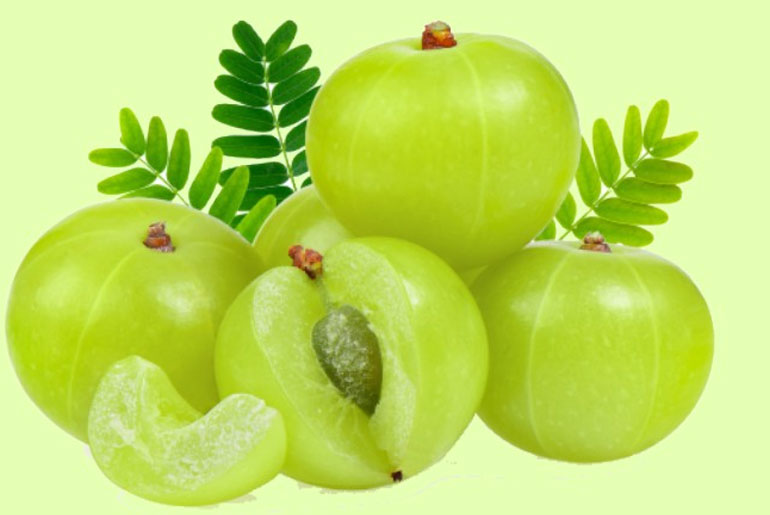Amla and Diabetes:
The increasing prevalence of diabetes, a metabolic disorder, is a growing concern worldwide, and India has witnessed a significant rise in the number of individuals affected by this condition. According to a Lancet study, India is now home to over 100 million diabetics, compared to 70 million in 2019, highlighting the urgent need for effective management strategies.
Diabetes is a complex condition that can affect various parts and functions of the body, posing an increased risk of complications such as heart attacks, stroke, kidney problems, nerve damage, gum disease, and eye problems. However, it’s important to emphasize that diabetes can be managed effectively through lifestyle interventions, with diet playing a crucial role.

Amla, with its rich history in traditional medicine and numerous health benefits, emerges as a valuable diabetes superfood. Its ability to control blood sugar spikes, improve metabolism, and protect pancreatic cells from oxidative stress and damage can significantly contribute to diabetes management. By embracing the wisdom of ancient remedies like amla, individuals can take proactive steps to enhance their well-being and better control this prevalent and challenging metabolic disorder.
All About Amla:
Amla, or Amalki, stands out as a remarkable fruit with a complex taste profile, featuring pungent, astringent, sweet, bitter, and sour flavors. According to Ayurveda, amla is renowned for its ability to balance all three doshas—vata, pitta, and kapha, with a particular emphasis on calming the pitta dosha. This cooling fruit leaves a sweet post-digestive effect, known as vipaka.
Considered one of the most potent fruits in Ayurveda, amla’s significance can be traced back to ancient texts like Charaka Samhita and Sushruta Samhita. It holds the revered status of a Rasayana, a rejuvenative substance, due to its exceptional Vitamin C content and high antioxidant activity. Every part of the amla tree is utilized for various medicinal purposes, addressing issues ranging from diabetes and ulcers to digestive problems, inflammation, skin, and hair health, among others. Amla is also regarded as a tonic for restoring lost vitality and vigor.
For individuals with diabetes, amla emerges as a wonder fruit, effectively preventing glucose spikes, enhancing metabolism, and safeguarding the heart from the adverse effects of the disease. While its benefits are numerous, it’s essential to consume amla in moderation as part of a balanced diet, taking full advantage of its healing properties while maintaining a healthy dietary balance.
Amla as an Ancient Remedy:
Amla’s rich history is deeply intertwined with traditional medicine systems and holistic well-being practices. Going back thousands of years, references in ancient texts like Charaka Samhita and Sushruta Samhita highlight amla’s significance as a remedy for various ailments, including diabetes. Scientifically known as Phyllanthus emblica, amla played a crucial role in herbal formulations for promoting overall health and managing blood sugar levels in ancient India.

Beyond India, amla found its place in Tibetan medicine, where it was employed to alleviate conditions such as abdominal pain, menstrual disorders, and gynecological imbalances. The Tibetan medicinal system also recognized amla’s ability to cleanse the body of toxins and metabolic residues, highlighting its detoxifying properties.
Moreover, amla was a common household ingredient in the Terai region of Nepal, where people harnessed its benefits for both hair and skin health. This historical legacy underscores amla’s enduring relevance as a natural remedy and a versatile fruit with a myriad of applications in traditional wellness practices.
Amla’s Advantages for Diabetes Management:

Amla, also known as Indian Gooseberry, is a powerhouse fruit with a wide range of health benefits. It not only helps in managing chronic diseases but also bolsters the immune system against seasonal infections. For individuals with diabetes, amla proves invaluable as it regulates blood sugar levels, reduces cholesterol, and prevents sudden spikes in sugar. Its contribution to a healthy metabolism and digestion further aids in preventing excess sugar accumulation. Therefore, incorporating amla into one’s regular diet is highly recommended for individuals with diabetes, offering a delicious and nutritious way to support overall health and well-being.
Unlocking the Benefits of Amla:
Amla offers several important health benefits, particularly for individuals managing diabetes. Let’s recap these benefits:
Regulating Blood Sugar: Amla is known for its hypoglycemic properties, which can help in regulating blood sugar levels. This makes it valuable for both type 1 and type 2 diabetes management by reducing the risk of sudden spikes and crashes in blood glucose levels.
Antioxidant Power: Amla is rich in antioxidants, particularly Vitamin C. These antioxidants play a crucial role in protecting pancreatic cells from oxidative stress and damage. This protection promotes insulin production and sensitivity, which are essential for effectively managing diabetes.
Improved Metabolism: Amla supports a healthy metabolism, aiding in the efficient utilization of glucose by the body. This helps prevent excess sugar from accumulating in the bloodstream, an important aspect of diabetes management.
Heart Health: Diabetes often coexists with cardiovascular issues. Amla’s ability to help lower cholesterol levels can reduce the risk of heart disease, which is a common concern for individuals with diabetes. Maintaining heart health is integral to overall well-being for people managing diabetes.
Incorporating amla into your diet, as mentioned earlier, can be a flavorful and nutritious way to harness these benefits while enjoying its unique taste and versatility. However, always consult with a healthcare professional or a registered dietitian before making significant dietary changes, especially if you have specific health concerns or are managing a medical condition like diabetes.
Incorporating Amla into Your Diet:
Incorporating amla into your diet can be both delicious and nutritious. Here are several ways to enjoy this versatile fruit:

Fresh Amla: You can consume raw amla by cutting it into small pieces. For added flavor, you can sprinkle a pinch of salt or chili powder. This method preserves the fruit’s natural freshness and nutritional value.
Amla Juice: Create a refreshing amla juice by blending fresh amla with water. To enhance its taste, you can add a touch of honey or a natural sweetener if desired. Amla juice is not only delicious but also packed with nutrients.
Amla Pickle: Amla can be pickled with various spices to create a flavorful and tangy condiment. Amla pickle not only enhances the taste of your meals but also provides the health benefits of amla.
Powdered Amla: Dried amla can be ground into a powder, which can be a convenient way to incorporate it into your diet. You can add powdered amla to smoothies, yogurt, or use it as a seasoning in your dishes. It adds a nutritional boost to your meals.
Amla Supplements: If fresh amla is not readily available or convenient for you, consider amla supplements. These supplements are available in various forms like capsules, tablets, or powders. However, it’s essential to choose high-quality supplements from reputable brands.
Amla Candy: Amla candy is a sweet treat that is popular among both children and adults. It provides a tasty way to enjoy the benefits of amla while satisfying your sweet cravings.
Who Should Avoid Consuming Amla:
These are important considerations when incorporating amla into your diet, especially if you have specific health conditions or concerns. Here’s a bit more detail on each of these points:
Blood Sugar Monitoring: If you’re managing diabetes and taking medication to control your blood sugar levels, it’s crucial to closely monitor your blood sugar when adding amla to your diet. Amla’s hypoglycemic properties could potentially enhance the effects of diabetes medications, leading to lower blood sugar levels (hypoglycemia). Hypoglycemia can be dangerous, so it’s important to work with your healthcare provider to adjust your medication dosage if needed.
Allergies: Allergies to amla or related fruits are relatively rare but can occur. If you have a known allergy to amla or any other fruits from the same botanical family, it’s best to avoid amla to prevent allergic reactions. Allergic reactions can range from mild skin irritations to more severe symptoms like hives or difficulty breathing.
Gastrointestinal Sensitivity: Amla can be acidic, which may not be suitable for individuals with sensitive stomachs or those who experience acid reflux issues. In such cases, consuming amla may lead to discomfort or exacerbate acid-related problems. If you have gastrointestinal sensitivities, it’s advisable to consult a healthcare professional before adding amla to your diet. They can provide guidance on whether amla is suitable for your specific digestive conditions.
Fascinating Facts About Amla:
Rich in Vitamin C: Amla is renowned for its exceptionally high Vitamin C content. In fact, it contains significantly more Vitamin C than many citrus fruits, making it an outstanding natural source of this essential nutrient. Vitamin C is crucial for immune system support, skin health, and overall well-being.
Traditional Hair Care: Amla has been a staple in traditional Indian hair care for centuries. It is believed to promote hair growth, strengthen hair follicles, and prevent premature graying. Many hair oils, shampoos, and conditioners in India contain amla extract or amla oil for its hair-nourishing properties.
Disclaimer:
The information contained in this article is for educational and informational purposes only and is not intended as a health advice. We would ask you to consult a qualified professional or medical expert to gain additional knowledge before you choose to consume any product or perform any exercise.









